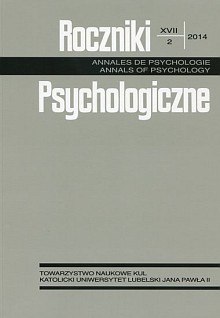The identification of random or careless responding in questionnaires: The example of the NEO-FFI
The identification of random or careless responding in questionnaires: The example of the NEO-FFI
Author(s): Krzysztof FronczykSubject(s): Psychology
Published by: Towarzystwo Naukowe KUL & Katolicki Uniwersytet Lubelski Jana Pawła II
Keywords: random responding; careless responding; Cattell’s sabotage index; FIC index; NEO-FFI
Summary/Abstract: The article presents two little-known indices of random or careless responding: Cattell’s sabotage index and fixed individualized chance (FIC) score. Both indices are used to identify people who provide content-irrelevant answers, such as random ones, in multidimensional questionnaires. The aim of the study was to verify empirically the diagnostic applications of these indices in distinguishing the actual NEO-FFI scores from random data generated by a computer. The study involved 943 participants and 1000 randomly generated protocols. Based on both indices in combination and using logistic regression, it proved possible to distinguish the actual data from the random data fairly well. Approximately 86% of all data was classified correctly. This result is quite high, given that some participants might have responded to the NEO-FFI items in a random way.
Journal: Roczniki Psychologiczne
- Issue Year: 17/2014
- Issue No: 2
- Page Range: 457-473
- Page Count: 17
- Language: English

